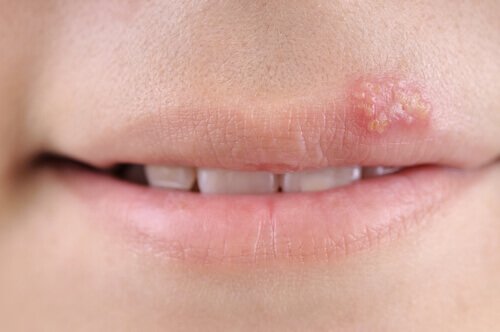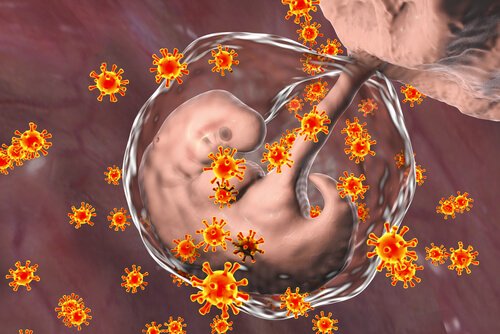Everything You Need to Know About Herpes During Pregnancy

This illness consists of two types. The first is herpes simplex type 1 (HSV-1), which affects mostly the lips and face. The second is herpes simplex type 2 (HSV-2), which can affect the genital are. Type 2 herpes spreads mostly through sexual contact.
Types of herpes virus
The herpes virus spreads through direct contact with lesions. While there are 2 types of viruses, they can spread indistinctly. In other words, a person can catch the herpes simplex HSV-1 in the genital region through oral sex.
Herpes of the mouth
As soon as a person catches herpes, the virus spreads below the skin and remains dormant. In some cases, it remains hidden and never reappears. However, in most cases, it manifests itself through an outbreak.
The virus spreads through direct contact with lesions, mostly through kissing. It appears in the form of sores or blisters on or around the mouth.

Genital herpes
This type of herpes spreads mainly through sexual contact. However, it can also spread when the mouth of a person with the HSV-1 virus is in contact with another person’s genital region, through oral sex.
Symptoms of a genital herpes infection
Most people who are infected with genital herpes present mild symptoms, or none at all. That’s why many don’t even know they have contracted the virus. The first outbreak tends to be the worst, because the infected person hasn’t developed antibodies to combat the infection.
The symptoms of genital herpes tend to appear within 14 days of being exposed to the virus. Symptoms include the following:
- Itching, burning, pain or tingling in the genital region.
- Vaginal discharge or secretion.
- Inflamed lymphatic glands.
- Pain when urinating.
- The appearance of red spots on the vagina or vulva, which later burst and turn into painful ulcers.
- The wounds can last several weeks during the first outbreak.
“Some people may present flu-like symptoms such as fever, headache and muscle pain”
Herpes during pregnancy: how does it affect the baby?
Despite medical advances and the fact that cases of spreading herpes to newborns have decreased, the risk still exists. Herpes in newborn babies can have serious consequences for their health.
If the virus is active during birth, the chances of spreading herpes to the baby are higher. Below are the most common forms of contagion, in detail:
- The most common form of contagion occurs during birth. The blisters that are located in the vagina or uterine wall spread the virus to the child as he or she passes through the birth canal.
- The risk is much higher when the mother contracts herpes during pregnancy close to her due date.
- There are very few cases in which infection occurs due to the rupturing of the amniotic sac.
Are C-sections performed in cases of genital herpes?
The answer depends on the moment of infection. If the mother contracted the virus prior to becoming pregnant or before the 3rd trimester, she may give birth naturally. This is true as long as she is not presenting symptoms.
This is possible because the mother develops antibodies against herpes shortly after contracting the illness. Therefore, she can pass the immunity on to her baby.
However, if a mother experiences an outbreak or presents symptoms of a possible outbreak close to her due date, she will need an immediate C-section.
Also, if a woman catches genital herpes in the final stage of pregnancy, experts also recommend C-section. This is true even if the woman is not presenting any symptoms of labor.

The prevention of herpes
If a woman is aware that she has been infected, or even that she may have been, it’s important she take certain measures to protect her child:
Before pregnancy
- If a woman even suspects she may have herpes, she must carry out monthly or even biweekly serological controls.
- Women who have tested positive for herpes prior to pregnancy must undergo weekly sexological exams starting at 32 weeks of gestation.
- If the studies reveal the presence of the virus, a specialist will examine the mother by way of colposcopy to confirm said presence.
- During the first weeks of pregnancy, the expectant mother must undergo a study to determine her antibody levels. This will verify whether or not she can spread the virus onto her unborn child.
After the baby’s birth
- Mothers and other infected persons must wash their hands well before coming into contact with the baby.
- Breastfeeding is only recommended if herpes lesions aren’t present on the mother’s nipples.
- You should never kiss a baby if herpes are present on your mouth.
- The risk of spreading herpes to a baby decreases after 4 weeks of age.
Herpes during pregnancy can be enormously dangerous for the baby. Therefore, it’s important to take measures in order to avoid infecting the newborn. If necessary, a doctor will call for a C-section rather than risking contagion during natural childbirth.
It’s extremely important for women to be informed about this virus in order to prevent it from spreading.
This illness consists of two types. The first is herpes simplex type 1 (HSV-1), which affects mostly the lips and face. The second is herpes simplex type 2 (HSV-2), which can affect the genital are. Type 2 herpes spreads mostly through sexual contact.
Types of herpes virus
The herpes virus spreads through direct contact with lesions. While there are 2 types of viruses, they can spread indistinctly. In other words, a person can catch the herpes simplex HSV-1 in the genital region through oral sex.
Herpes of the mouth
As soon as a person catches herpes, the virus spreads below the skin and remains dormant. In some cases, it remains hidden and never reappears. However, in most cases, it manifests itself through an outbreak.
The virus spreads through direct contact with lesions, mostly through kissing. It appears in the form of sores or blisters on or around the mouth.

Genital herpes
This type of herpes spreads mainly through sexual contact. However, it can also spread when the mouth of a person with the HSV-1 virus is in contact with another person’s genital region, through oral sex.
Symptoms of a genital herpes infection
Most people who are infected with genital herpes present mild symptoms, or none at all. That’s why many don’t even know they have contracted the virus. The first outbreak tends to be the worst, because the infected person hasn’t developed antibodies to combat the infection.
The symptoms of genital herpes tend to appear within 14 days of being exposed to the virus. Symptoms include the following:
- Itching, burning, pain or tingling in the genital region.
- Vaginal discharge or secretion.
- Inflamed lymphatic glands.
- Pain when urinating.
- The appearance of red spots on the vagina or vulva, which later burst and turn into painful ulcers.
- The wounds can last several weeks during the first outbreak.
“Some people may present flu-like symptoms such as fever, headache and muscle pain”
Herpes during pregnancy: how does it affect the baby?
Despite medical advances and the fact that cases of spreading herpes to newborns have decreased, the risk still exists. Herpes in newborn babies can have serious consequences for their health.
If the virus is active during birth, the chances of spreading herpes to the baby are higher. Below are the most common forms of contagion, in detail:
- The most common form of contagion occurs during birth. The blisters that are located in the vagina or uterine wall spread the virus to the child as he or she passes through the birth canal.
- The risk is much higher when the mother contracts herpes during pregnancy close to her due date.
- There are very few cases in which infection occurs due to the rupturing of the amniotic sac.
Are C-sections performed in cases of genital herpes?
The answer depends on the moment of infection. If the mother contracted the virus prior to becoming pregnant or before the 3rd trimester, she may give birth naturally. This is true as long as she is not presenting symptoms.
This is possible because the mother develops antibodies against herpes shortly after contracting the illness. Therefore, she can pass the immunity on to her baby.
However, if a mother experiences an outbreak or presents symptoms of a possible outbreak close to her due date, she will need an immediate C-section.
Also, if a woman catches genital herpes in the final stage of pregnancy, experts also recommend C-section. This is true even if the woman is not presenting any symptoms of labor.

The prevention of herpes
If a woman is aware that she has been infected, or even that she may have been, it’s important she take certain measures to protect her child:
Before pregnancy
- If a woman even suspects she may have herpes, she must carry out monthly or even biweekly serological controls.
- Women who have tested positive for herpes prior to pregnancy must undergo weekly sexological exams starting at 32 weeks of gestation.
- If the studies reveal the presence of the virus, a specialist will examine the mother by way of colposcopy to confirm said presence.
- During the first weeks of pregnancy, the expectant mother must undergo a study to determine her antibody levels. This will verify whether or not she can spread the virus onto her unborn child.
After the baby’s birth
- Mothers and other infected persons must wash their hands well before coming into contact with the baby.
- Breastfeeding is only recommended if herpes lesions aren’t present on the mother’s nipples.
- You should never kiss a baby if herpes are present on your mouth.
- The risk of spreading herpes to a baby decreases after 4 weeks of age.
Herpes during pregnancy can be enormously dangerous for the baby. Therefore, it’s important to take measures in order to avoid infecting the newborn. If necessary, a doctor will call for a C-section rather than risking contagion during natural childbirth.
It’s extremely important for women to be informed about this virus in order to prevent it from spreading.
All cited sources were thoroughly reviewed by our team to ensure their quality, reliability, currency, and validity. The bibliography of this article was considered reliable and of academic or scientific accuracy.
- Straface, Gianluca & Selmin, Alessia & Zanardo, Vincenzo & Santis, Marco & Ercoli, Alfredo & Scambia, Giovanni. (2012). Herpes Simplex Virus Infection in Pregnancy. Infectious diseases in obstetrics and gynecology. 2012. 385697. 10.1155/2012/385697.
- Straface, Gianluca et al. “Herpes simplex virus infection in pregnancy”Infectious diseases in obstetrics and gynecology vol. 2012 (2012): 385697.
This text is provided for informational purposes only and does not replace consultation with a professional. If in doubt, consult your specialist.








